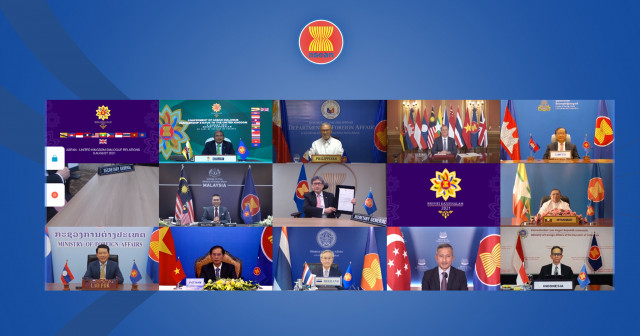Opinion: The Potential Opportunities of the ASEAN-UK Dialogue Partner

- By Vanndasambath Chhuon
- January 6, 2022 4:37 PM
After Brexit, interactions between the Association of Southeast Asian Nations (ASEAN) and the United Kingdom (UK) were no longer mediated under the framework of the ASEAN-EU Dialogue Partnership.
Considering ASEAN as a key region in contemporary world politics, the UK has expanded its interest to pave the way for greater engagement with ASEAN with its ‘Global UK’ ambitions and Indo-Pacific Tilt strategy. In 2019, the UK Mission to ASEAN was established and the UK was officially granted the status of the 11th ASEAN Dialogue Partner on 5 August 2021.
The presence of the ASEAN-UK Dialogue Partnership has had a substantial impact on ASEAN and the UK in promoting regional security and increasing socio-political engagement, trade, and economic development.
Sociopolitically, the ASEAN-UK Dailouge Partnership demonstrates high-level and deepened engagement on both bilateral relations between the ASEAN Member States and the UK, as well as multilateral cooperation in support of the ASEAN community building across all three pillars of political development; exchange of views, and discussion on state conflict, and social issues. Furthermore, ASEAN is a vital region in demonstrating the UK's competence and ambition to become an influential player in the Indo-Pacific, and access to a pivotal role in Southeast Asia. At the same time, new opportunities for ASEAN will benefit from various areas of multilateral cooperation and collaboration in enhancing trust and confidence, addressing social and environmental issues, and improving science and technology, education, public health, and governance.
With a population of 650 million and a GDP of $ 3 trillion, the Southeast Asian region has emerged as a powerful and vital trading partner for the UK. ASEAN will benefit from new initiatives and programs, new economic cooperation mechanisms, or Free Trade Agreements with the UK, which seeks to find an agreement to replace its previous position in the EU. In addition, through ASEAN-UK Cooperation, the UK also would be able to gain benefit in the process of negotiation to be a part of the Comprehensive and Progressive Agreement for the Trans-Pacific Partnership (CPTPP) since five of ASEAN member states are the member of this agreement. Additionally, the closer economic ties with ASEAN, a manufacturing hub, will improve the UK's integration into global value chains outside the EU, boosting product matching, supply chain efficiency, and market demand. Moreover, the UK's competitiveness in the digital services economy, research and development, services, and sustainable products is a key channel for integrating the UK economy into ASEAN's existing market and other partners.
In terms of security, ASEAN countries will benefit from the UK, even though it might play a modest but significant role in maintaining the balance of power, softening the US-China rivalry, and broadening the region's strategic options. Furthermore, the presence of the UK in the Indo-Pacific region will bring balance to the security interests of ASEAN claimant states such as Brunei, Malaysia, the Philippines, and Vietnam in their confrontation with China over the South China Sea Conflict. But this also poses some challenges along the way to ASEAN member states, particularly small states such as Cambodia. The deployment of the HMS Queen Elizabeth aircraft carrier to the South China Sea in May 2021 by the Royal Navy and other naval forces, however, unequivocally demonstrates that the concept of Global Britain encompasses more than just trade and economic flows. It also comprises a new geopolitical vision of the UK's involvement in the Indo-Pacific to strengthen its role in regional security.
However, there are still challenges. For instance, there will be issues for ASEAN in the future if the UK, along with its security partners such as Vietnam, the Philippines, Malaysia, and Brunei, has a confrontation over the South China Sea disputes. It was the culmination of the sort of intense diplomatic ground game that will be vital if the United Kingdom is to capitalize on its new enhanced status within ASEAN. Critically, the UK's posture in deepening its integration with ASEAN will increase the potential complexity of the geopolitical risk and the power competition in the region. As ASEAN is the geographical heart of the Indo-Pacific where superpowers play their power game, as evidenced by intensifying rivalry between the US and China.
Therefore, the ASEAN-UK dialogue partnership will provide potentially great opportunities to advance the relations with both sides. It can also benefit socioeconomic development and the political-security balancing. In this regard, the UK could use this path to reach its ambition in turning Global Britain into a reality as well as to exert influence in the region. The successful engagement with ASEAN will hinge on the UK's ability to position itself as a "flexible" and "firm" partner while avoiding confrontation over critical geopolitical issues. Meanwhile, ASEAN member states should use the ‘smart’ and ‘balanced policy’ as their prior foreign policy strategies to pursue opportunities and prevent risks at the same time.
Vanndasambath Chhuon is a fresh graduate majoring in Political Science and International Relations, Paragon International University. His research interest covers the Cambodia-UK Relations, and ASEAN-UK Bilateral and Multilateral Relations.















